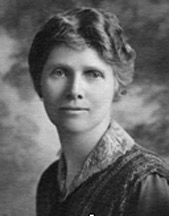1871 – 1964
Activist for social reform and international peace
Mary Julia Workman had a hand in almost every social welfare effort in Los Angeles over the course of her working life. She was an elementary school teacher and activist for social welfare, municipal reform and international peace. She founded the Brownson House Settlement Association in 1901 and led the Association in its service to needy Los Angeles residents for 20 years. She was the first woman to join the Municipal League to monitor civic services and was named to the Los Angeles Civil Service Commission from 1927-1928 at that time, highly unusual for a woman.
During World War II she championed the civic rights of Japanese Americans and, throughout her life, denounced prejudice against African-Americans in Los Angeles, writing to the mayor about the deplorable “deprivation of civil liberties” suffered by black Angelenos. In her role as social reformer, civil servant and peace activist, she helped to establish both the League of women Voters and the National Conference of Christians and Jews in Los Angeles.
Throughout her career, Workman challenged common assumptions about and treatment of immigrants. Her direct work with the foreign born taught her to appreciate the contributions of other cultures to American society. She recognized the need for change in attempts to “Americanize” the immigrants in an oppressive manner. She came to understand the need for workers, volunteers and clients to learn more about each other and to develop trust in order to benefit the immigrants and the broader community. Her insights and approach to this process brought significant changes to the way immigrants and, later, inner city and poor citizens, were treated. Her understanding of diversity and its value to society has become increasingly valuable.
Workman’s interests were not confined solely to the United States,she was also a major advocate for world peace. In this arena, she worked through the Catholic Church with such organizations as the Catholic Association for International Peace. In 1924 she founded the diocesan branch of the National Council of Catholic women. Her activities with the Roman Catholic Church were honored by Pope Pius X in 1925.
From 1925 until 1928, she also entered the political sphere as president of the Public Service Commission and continued her activism in labor issues, politics, and other areas until her death at age ninety-three.
